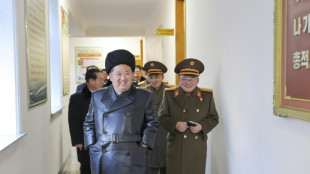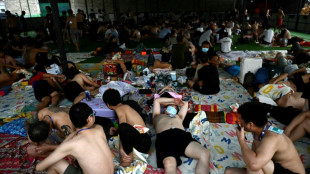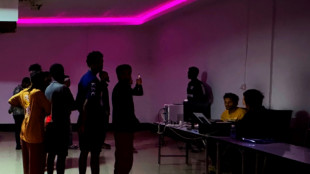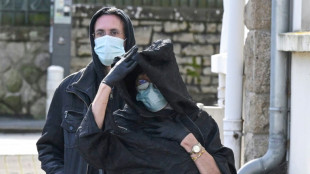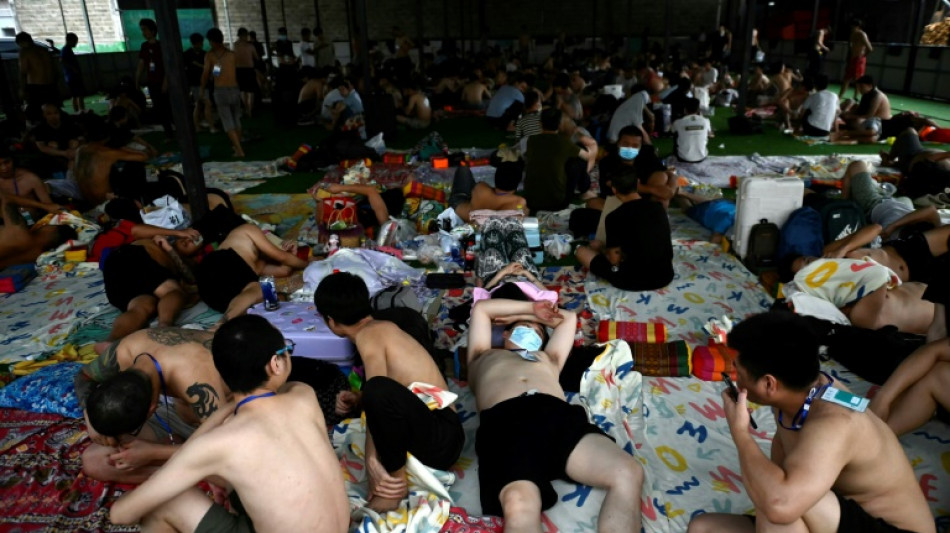

'Escaping hell': Myanmar scam centre workers plead to go home
Hundreds of exhausted young men lie in an open-sided detention centre in a seedy Myanmar border town, sweating through thick tropical heat by day and prey to clouds of mosquitoes by night.
They are among some 7,000 people from more than two dozen countries released from scam compounds who are now enduring a gruelling wait to be sent home through Thailand.
Conditions in the overcrowded temporary camp visited by AFP in the town of Myawaddy, near the Thai border, were squalid and those held there were begging to leave.
"It's really no good," one 18-year-old Malaysian man told AFP, saying the toilets and showers were so dirty they were unusable.
"I hope I can contact my parents quickly so I can go."
A Chinese detainee who gave his family name as Wang said he was "very happy" at the prospect of getting out.
"I can finally escape this hell... China is the safest," he said.
- 'Help me, help me, help me' -
Scam centres have sprung up in Myanmar's lawless border areas in recent years as part of a criminal industry worth billions of dollars a year.
Thousands of foreign workers staff the centres, trawling social media for victims to fleece, often through romance or investment cons.
Many workers say they were trafficked or tricked into taking the work and suffer beatings and abuse, though the government in China -- where most come from -- regards them as criminal suspects.
Under heavy pressure from Beijing, Myanmar's junta and allied militias have taken action to curb the centres.
The "crackdown" has so far involved armed uniformed men coming to the sites and asking for volunteers to leave and go home, several freed workers told AFP in Myawaddy.
But processing the workers for repatriation has been slow, leaving them trapped in limbo, smoking and playing cards to pass the time in the detention facility, which has a roof but no walls to keep the elements and insects out.
Many had their passports confiscated by scam centre bosses, and those AFP spoke to said their mobile phones were taken away.
An Indian man who said he was tricked into working in the scam centres after applying for a data entry job in Thailand, told AFP he had contacted his embassy in Bangkok several times.
He begged them "help me, help me, help me. But no one helps me," he said.
"The feeling is not good because we are in trouble right now."
Myanmar's raging civil war has complicated efforts to tackle the scam compounds, as most are in areas outside the ruling junta's control.
The Karen Border Guard Force (BGF), an independent militia allied to the junta, controls two of the most notorious scam towns, Myawaddy and Shwe Kokko.
The BGF released thousands from illegal scam compounds last week and wants to swiftly deport them to neighbouring Thailand for repatriation, saying it is struggling to cope with looking after so many people.
"People have to stay in cramped conditions," said its spokesman Naing Maung Zaw.
"We have to cook three meals to feed thousands of people and arrange their healthcare," he said, adding he was worried about a possible outbreak of contagious diseases.
- Struggling to cope -
The United Nations estimates that as many as 120,000 people -- many of them Chinese men -- may be working in Myanmar scam centres against their will.
Gangs that run the compounds lure people with promises of high-paying jobs, then force them to defraud people from around the world or face severe punishment and abuse.
The sites on the Thai-Myanmar border vary in how they treat their staff, analysts say, and Thai officials have claimed that a majority of workers go there intentionally.
Victims released from smaller compounds claim that as a more sophisticated operation, Shwe Kokko -- one of the area's biggest scam hubs -- draws more people who willingly go there to commit fraud.
But "not everyone living in Shwe Kokko is a criminal," Naing Maung Zaw said.
A Chinese man surnamed Shen denied allegations that the scam centre workers had travelled to Myanmar intentionally, saying he had been tricked and forced.
"If I did it voluntarily, I would take all legal responsibilities," he said.
But so far China has treated all returning detainees -- 600 were sent back last week -- as suspects, with state TV showing them marched off the plane in handcuffs by police on their return home.
Thailand, Myanmar and China are expected to hold three-way talks in the coming weeks to arrange logistics for further repatriations, with Thailand saying it is working with over a dozen foreign embassies.
One of 14 detained Pakistani men who hoped to return before Ramadan said he felt abandoned by authorities after hearing of other repatriations.
"We know we're safe now. But it's been eight days. So why can't we go to Thailand now?" he told AFP.
Stretched for resources to look after the hundreds of foreigners in their charge, Naing Maung Zaw pleaded to foreign embassies to "come and take your nationals ... They want to go home."
W.Wouters--JdB
